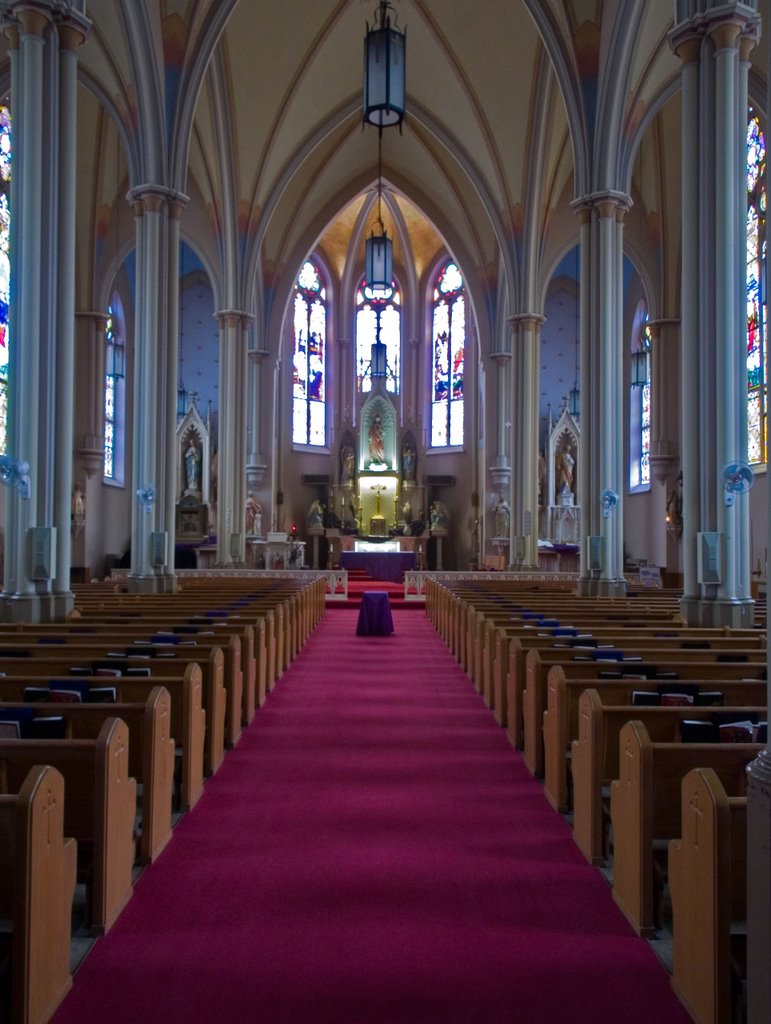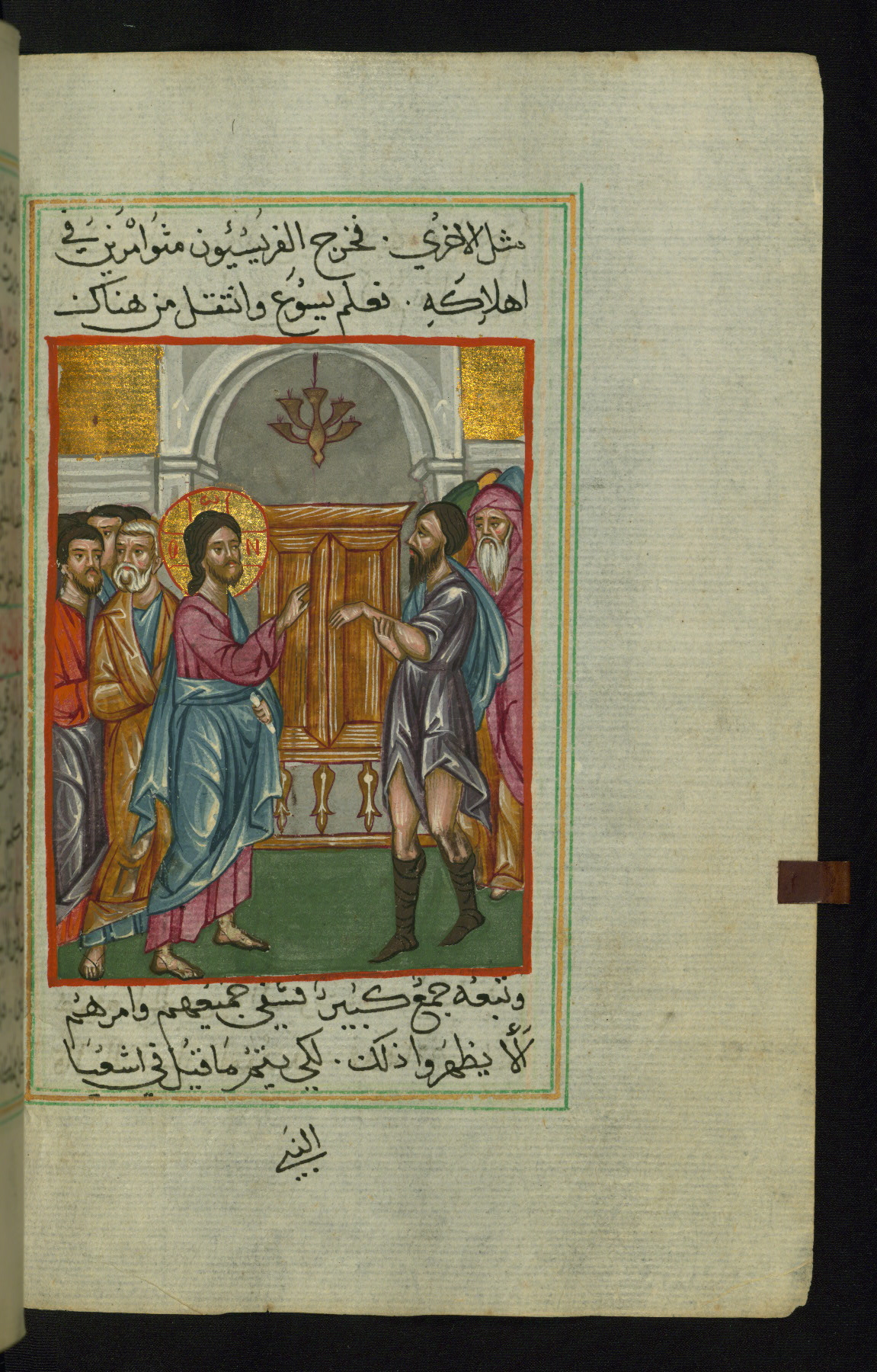Luke CHAP. 6
6:6–11
6. And it came to pass also on another sabbath, that he entered into the synagogue and taught: and there was a man whose right hand was withered.
7. And the Scribes and Pharisees watched him, whether he would heal on the sabbath day; that they might find an accusation against him.
8. But he knew their thoughts, and said to the man which had the withered hand, Rise up, and stand forth in the midst. And he arose and stood forth.
9. Then said Jesus unto them, I will ask you one thing; Is it lawful on the sabbath days to do good, or to do evil? to save life, or to destroy it?
10. And looking round about upon them all, he said unto the man, Stretch forth thy hand. And he did so: and his hand was restored whole as the other.
11. And they were filled with madness; and communed one with another what they might do to Jesus.
AMBROSE. The Lord now proceeds to another work. For He who had determined to make the whole man safe, was able to cure each member. Hence it is said, And it came to pass also on another sabbath, that he entered into the synagogue and taught.
BEDE. He chiefly heals and teaches on the sabbaths, not only to convey the meaning of a spiritual sabbath, but because of the more numerous assembly of the people.
CYRIL OF ALEXANDRIA. But He taught things far beyond their comprehension, and opened to his hearers the way to future salvation by Him; and then after having first taught them, He suddenly shewed His divine power, as it follows, and there was a man there whose right hand was withered.
BEDE. But since the Master had excused by an undeniable example the breach of the sabbath, with which they charged His disciples, their object is now by watching to bring a false accusation against the Master Himself. As it follows, And the Scribes and Pharisees watched him, if he would heal on the sabbath, that if He did not, they might accuse Him of cruelty or impotence; if He did, of violation of the sabbath. Hence it follows, that they might find an accusation against him.
CYRIL OF ALEXANDRIA. For this is the way of the envious man, he feeds in himself his pang of grief with the praises of others. But the Lord knew all things, and searches the hearts; as it follows, But he knew their thoughts, and said to the man who had the withered hand, Rise up, and stand. And he arose, and stood forth, that perchance he might stir up the cruel Pharisees to pity, and allay the flames of their passion.
BEDE. But the Lord anticipating the false charge which they were preparing against Him, reproves those who by wrongly interpreting the law thought that they must rest on the sabbath-day even from good works; whereas the law commands us to abstain from servile works, i. e. from evil, on the sabbath. Hence it follows, Then said Jesus unto them, I ask you, Is it lawful to do good on the sabbath, &c.
CYRIL OF ALEXANDRIA. This is a very useful question, for if it is lawful to do good on the sabbath, and there is no reason why those who work should not obtain mercy from God, cease to gather up accusation against Christ. But if it be not lawful to do good on the sabbath, and the law prohibits the safety of life, thou art become the accuser of the law. For if we examine the very institution of the sabbath, we shall find it was introduced for an object of mercy, for God commanded to keep holy the sabbath, that may rest thy man servant and thy maid servant, and all thy cattle. (Exod. 20:23.) But he who has mercy on his ox, and the rest of his cattle, how much rather will he not have mercy on man troubled with a severe disease?
AMBROSE. But the law by things present prefigured the form of things future, among which surely the days of rest to come are to be not from good works but from evil. For although secular works may be given up, yet it is no idle act of a good work to rest in the praise of God.
AUGUSTINE. Aug. de Qu. Ev. l. iii. qu. 7.) But though our Lord was healing the body, He asked this question, “is it lawful to save the soul or to lose it?” either because He performed His miracles on account of faith in which is the salvation of the soul; or, because the cure of the right hand signified the salvation of the soul, which ceasing to do good works, seemed in some measure to have a withered right hand, i. e. He placed the soul for the man, as men are wont to say, “So many souls were there.”
AUGUSTINE. (de Con. Ev. l. ii. c. 35.) But it may be questioned how Matthew came to say, that they asked the Lord, whether it was lawful to heal on the sabbath, when Luke in this place states that they rather were asked of the Lord. We must therefore believe that they first asked the Lord, and that then He understanding by their thoughts that they sought an opportunity to accuse Him, placed the man in the midst whom He was going to heal, and asked the question which Mark and Luke relate Him to have asked. It follows, And looking round about upon them all.
TITUS BOSTRENSIS. When the eyes of all were, as it were, riveted together, and their minds also fixed upon the consideration of the matter, he said to the man, Stretch forth thy hand; I command thee, Who created man. But he who had the withered hand hears, and is made whole, as it follows, And he stretched it, and it was restored. But they who should have been astonished at the miracle, increased in malice; as it follows, But they were filled with madness; and communed one with another what they should do to Jesus.
CHRYSOSTOM. (Hom. in Matt. 40.) And as Matthew relates, they go out to take counsel, that they should kill him.
CYRIL OF ALEXANDRIA. Thou perceivest, O Pharisee, a divine Worker, and Him Who delivers the sick by His heavenly power, and out of envy thou breathest forth death.
BEDE. The man represents the human race, withered by the unfruitfulness of good works, because of the hand in our first parent stretched forth to take the apple, which was healed by the innocent hand stretched forth on the cross. And rightly was the withered hand in the synagogue, because where there is the greater gift of knowledge, there the transgressor lies under the greater blame.
AMBROSE. You have heard then the words of Him who says, Stretch forth thy hand. That is a frequent and common cure, and thou that thinkest thy hand is whole, beware lest it be contracted by avarice or sacrilege. Stretch it forth oftener to help thy neighbour, to protect the widow, to save from injury him whom you see the victim of unjust attack; stretch it forth to the poor man who beseeches thee; stretch it forth to the Lord, to ask pardon of thy sins; as the hand is stretched forth so is it healed. (1 Kings 13:5, 6.)




